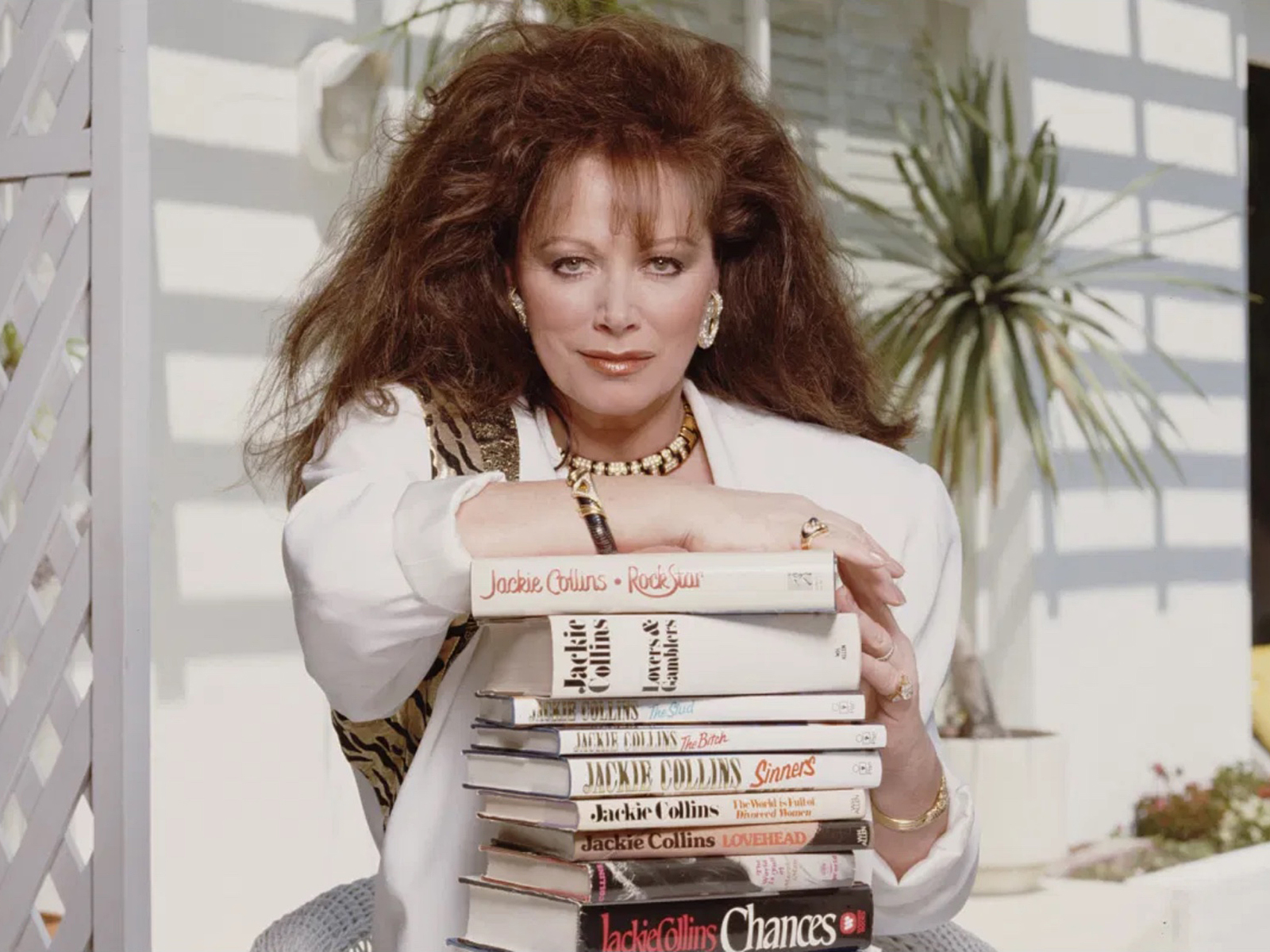
- Film
Docs: Lady Boss: The Story of Jackie Collins (2021)
Queen of trash? Feminist writer? Powerful emissary of women’s secret sexual desires? Gay icon? Insightful, affectionate, none too critical, Laura Fairrie’s new documentary about the life of novelist Jackie Collins, aptly titled Lady Boss, aims to reveal the “real” woman behind and beyond the exterior veneer.
Over a period of four decades, Jackie Collins, who was born in London in 1937, produced 32 novels, all of which appeared on the New York Times bestseller list. How many contemporary writers can match her prolific record, not to mention commercial appeal? Her books have sold more than 500 million copies and have been translated into 40 languages. Eight of her novels have been adapted to the screen, either as films or television miniseries.
Raunchy sex, a family killed with a machete, incest, rape, philandering: that’s just in the first chapters of almost every Collins book, including her 1983 mega-hit, Hollywood Wives. The new documentary makes sure not to promote her literary status, while at the same time not dismissing her as a merely low-brow author.
It makes a strong case of why and how Collins moved to Los Angeles, the capital of dreams, Hollywood and otherwise. She quickly adopted the American obsessive urge for self-invention, perpetuating a youthful au-courant persona, realizing that only in La La Land, she could reach the stars, and continue to reimagine herself endlessly.
Jackie mastered the art of reconstruction by distinguishing clearly between her public persona, as a strong woman who can match any man, and her personal life, which was more tender and fragile, and which she protected ferociously from outsiders.
There are some interesting disclosures about her early life, like the fact that her father Joseph was a South-African Jew. When Joan speaks of their dad, she calls him strict, remote but also charming. In Jackie’s diary, however, Joseph is depicted as a tyrant cruel to his wife Elsa, at one point declaring, “Don’t forget, I am king!” Joseph told Jackie she wasn’t beautiful or slim enough, “I look awful, Joan also told me so,” reads another of her diary entries.
We learn that there was a sibling rivalry with her older sister, the actress and celeb Joan Collins, who is now 90. Reminiscent of a classic Hollywood tale, Jackie was insecure, growing up in the shadow of her star sister. Joan achieved fame in the 1950s as an actress and sex symbol, only to see her career in decline in the late 60s and 70s, during which time Jackie began making strides.
Joan, who is thoroughly interviewed for the documentary, says about their unsteady relationship: “It was like a marriage, everything doesn’t go perfectly wonderfully all the time.”
Joan’s success made Jackie feel like an “also-ran,” in spite of Joan describing her as having a “fantastic figure.”
Photographs of her as a teenager reveal a woman very different from her later image. In her early 20s, she had plastic surgery to elevate her looks. “I love my new nose,” she wrote in one candid entry of her diary.
Jackie’s diary is used in this documentary as valuable source material, revealing a much darker story than might seem on the surface of her life and the persona she had cultivated.
Rather attractive in a glamorous way, she sported long hair, shoulder pads (a la Joan Crawford), jackets made of leopard-print fabric. In one revelatory scene, we see how carefully she prepared before making personal appearances on TV talk shows or promoting her latest book. But even in the controlled moments, we can witness the inner anxiety and turmoil, at times struggling to hold down insecurity and pain.
Her first marriage to Wallace Austin proved disastrous due to his drug addiction and mental health. Nonetheless, Jackie found the strength to leave him even when he threatened suicide, which he later committed; Jackie says she does not feel guilt over it.
Her second husband, Oscar Lerman, adored Jackie and encouraged her to finish the book that would become her first bestseller, The World Is Full of Married Men.
Joan eventually starred in two movies based on Jackie’s books, The Stud and The Bitch. Some nasty commentators described them as “the Gish sisters of soft porn” in reviewing those pictures.
At one point, both sisters were on the same level, Joan’s career enjoyed a resurgence with the long-running TV series, Dynasty, while Jackie had her biggest success with Hollywood Wives. Even so, Jackie was not particularly happy when Joan “invaded her literary territory” and tried to write some salacious novels of her own.
Jackie’s beloved husband Oscar died in 1992, and there was a third bond with Frank Calcagnini, a controlling playboy disliked by her friends and family. Joan describes her sister’s involvement with the angry Calcagnini by simply saying: “Many women put up with a lot.”
In her last years, Jackie was through with serious relationships but would still take lovers. It was as if she was trying to live up to the sexually motivated heroines of her books, even if she had to face attacks by self-righteous viewers on talk shows. Romance novelist Barbara Cartland, made-up like Baby Jane Hudson, once calls Jackie’s novels “evil.”
There was nothing passive about Jackie the private person, or the public persona, even if she could not control her domestic issues as much as she did with her pen – her heroines spoke directly to women of her generation, as well as younger ones.
Jackie stayed true to her image up to the bitter end, keeping quiet about her long battle with cancer, while doing a final book tour.
Lady Boss offers a look at a fierce woman who took a bold stance against the prevalent sexual double standard, striking a blow for women seeking pleasure for pleasure’s sake.
Lady Boss airs on CNN June 27, after its world premiere (in the Spotlight section) at the Tribeca Festival this weekend.

